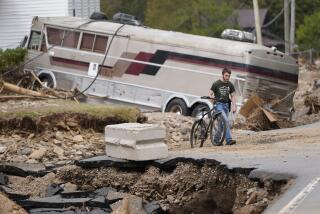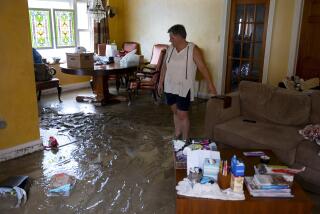Colorado flood rescue efforts by air, land reach epic proportions
BOULDER, Colo. – Helicopters returned to the skies over Colorado on Monday as officials took advantage of a break in the weather to step up rescue efforts reminiscent of those in 2005 when Hurricane Katrina devastated New Orleans.
It was drizzling across much of the state Monday. That was a relief from the record-setting torrents that racked Colorado last week, turning tame brooks into raging walls of water that destroyed roads, brought down bridges and overflowed dams. The death toll stood at six confirmed deaths, but several people were missing and presumed dead.
More than 1,200 people remained unaccounted for across the state. Officials said they believed the overwhelming majority were people who were out of touch because of lost cellphones or electrical power. However, no one knows for sure.
“Some areas of Larimer County experienced a hundred-year flood, some a thousand-year flood,” said Jennifer Hillman, a spokeswoman for the Larimer County Sheriff’s Department. “When you’re talking about rivers cresting 10 feet over their banks, no one can prepare for that. Blizzards and wildfires -- those are things we do prepare for. A flood is a whole different beast.”
Even though the weather is improving, the scope of the ongoing rescue efforts remained large, and the toll of flood devastation takes in about 4,500 square miles -- about the size of Connecticut. Helicopters remained the best way to reach the thousands still isolated in mountain areas, cut off with no power or food and surrounded by undrinkable water.
The air rescue operations “are believed to be the largest airlift rescue since Hurricane Katrina” said 1st Lt. Skye Robinson, spokesman for the Colorado National Guard. “You just never thought it would happen here.”
Whole towns, including Lyons, Jamestown, Estes Park and Glenhaven remained isolated Monday. Even when the waters recede, officials expect it will be many months before refugees can return.
“In Glenhaven, people hiked to the top of a mountain to get cell service and let people know where they were,” Hillman said. She said many first responders and neighbors who pulled together during last year’s High Park fire have been using those connections to respond to the current disaster.
“We’ve been through a fire and now a flood,” Hillman said, adding that she and other locals are bracing for an even worse scenario as they race to evacuate those still trapped by floodwaters. “It can snow in September, so we want to get these people out,” she said.
At daylight Monday, helicopters took off from the Boulder airport and speedily returned. Each helicopter brought a fresh batch of evacuees from places such as Big Elk Meadow and Jamestown. When the helicopters touched down, evacuees were brought out, many with dogs on leashes and holding children wearing backpacks. They went into a hangar to be examined by medical personnel, then were loaded into school buses and taken to shelters in Boulder.
By the afternoon, fog began rolling into Boulder and officials worried that the helicopters would be grounded. “There is a window for us,” Robinson said. “We’re going to fly until it is not safe anymore.”
A similar air operation was underway on Larimer County.
Numbers were estimates, but officials said about 11,700 people had been evacuated by air and truck. Almost 2,000 people remained in the 26 shelters established around the state. About 17,500 residential structures were damaged and at least 1,500 were destroyed.
The tally includes Larimer County, where officials reported 398 people unaccounted for, and 4,500 homes and 500 businesses damaged or destroyed.
The flooding has devastated much of the populous eastern portion of the state, a swath of about 200 miles from the north to the south. Parts of at least 15 counties have been hit.
An estimated 35 bridges and more than 100 miles of road will need repair just in Boulder County. That could take $100 million to $150 million and months, if not years, to accomplish.
ALSO:
At least 12 dead in Washington Navy Yard shooting
Coast Guard rescues 2 men lost at sea for eight days
Man charged in Times Square police-involved shooting
Follow L.A. Times National on Twitter
More to Read
Sign up for Essential California
The most important California stories and recommendations in your inbox every morning.
You may occasionally receive promotional content from the Los Angeles Times.











